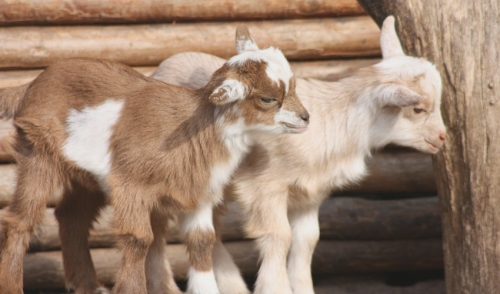

If you’re a farmer or just want to raise goats, sooner or later you may have baby goats to care for particularly if you’re raising goats for milking. Providing a baby goat( kid ) with the right care, feeding, and shelter are critical to helping the baby grow into a healthy, hearty adult goat.
Right After Birth
Immediately after your baby goat is born, you should be present. This helps the baby goat imprint on you and it starts to get accustomed to human contact.
Allow the umbilical cord to break naturally, and only trim it if it is longer than four inches. You will want the cord to be about three to four inches in length. If you need to trim the cord, use a sterilized pair of scissors, then clean the cord with iodine, and allow the stub to fall off naturally.
If possible, leave the baby goat with the mother. She will lick the baby clean, and the baby goat and its mother will bond. The mother goat will likely eat some of the afterbirth; that’s fine. Your job is to stay and monitor the situation.
Make sure the baby goat feeds from its mother within the first hour after birth. If the kid does not feed from its mother, you will need to bottle-feed it colostrum, the early milk that is high in nutrients and immune-building properties. Colostrum can come from its mother, another goat, or purchased at a feed store.
Decide: Bottle-Fed or Mother-Fed
You will need to decide whether you’re going to have the mother raise and nurse the baby, or whether you will bottle feed your baby goat. The difference is that bottle-fed goats are usually more attached to humans, tamer, and less skittish.
Even if you want to bottle-feed the baby goat, leave it with its mother for at least a few days so it can get the nutrient-rich colostrum.
Bottle-Feeding
If you plan to bottle feed, you will need a few items: a goat baby bottle, a lamb or kid nipple, goat milk replacement formula, and colostrum replacement (if necessary).
Also, you will need to teach your baby goat to drink from a bottle. Squirting milk into its mouth quickly will help it associate the bottle with milk and it will learn. Baby goats should be fed at least four times a day for the first month, and then you can reduce the number of feedings to three. Follow the advice of your vet on the exact amounts of milk to feed and any other supplements needed.
Mother-Fed Kids
If you allow the mother to raise the baby goat, she does all the work. For the first six to eight weeks the baby goat will drink only from its mother, and then you can transition to hay and other foods.
If you choose this route, you’ll want to spend lots of time cuddling and handling the baby goat so that it learns to tolerate human contact and does not end up skittish.
Transitioning From Milk To Solid Foods
You may start offering small amounts of grain at one week to help jump-start the goat’s rumen development. Weaning usually happens at around four weeks of age, but can happen at six to eight weeks of age.
You may offer grass, small amounts of grain, fresh water, and pasture time to baby goats at around 30 days old.
You will want to ensure that your baby goat does not transition too fast to grass as that could cause bloating and digestive issues. A goat’s diet is mostly hay—around 80 percent. About 15 percent of their diet should be pasture and weeds or hay pellets, and only about 5 percent should be grain. You will also need to provide your kids (and your adult goats) with a mineral block or loose minerals.
You should slowly decrease the amount of milk you offer until your baby goat is eating just like the other adult goats.
The Best Environment for Healthy Growth
Baby goats need a draft-free, warm, and dry shelter with clean bedding. Each goat needs roughly 10 square feet of space in the shelter. You can cover the dirt with hay or wood shavings for bedding.
Once on pasture, the kid will need a clean pasture without too much manure or other wastes. Avoid pasture with azaleas or rhododendrons, these plants are poisonous to goats. Also make sure you do not feed moldy grain, which is also poisonous.
You will want to keep baby goats together and separate from other goats, though you should socialize them on occasion with the rest of the herd. They may need a separate pasture to ensure they stay healthy.
 Contact Jaguza Support
Contact Jaguza Support